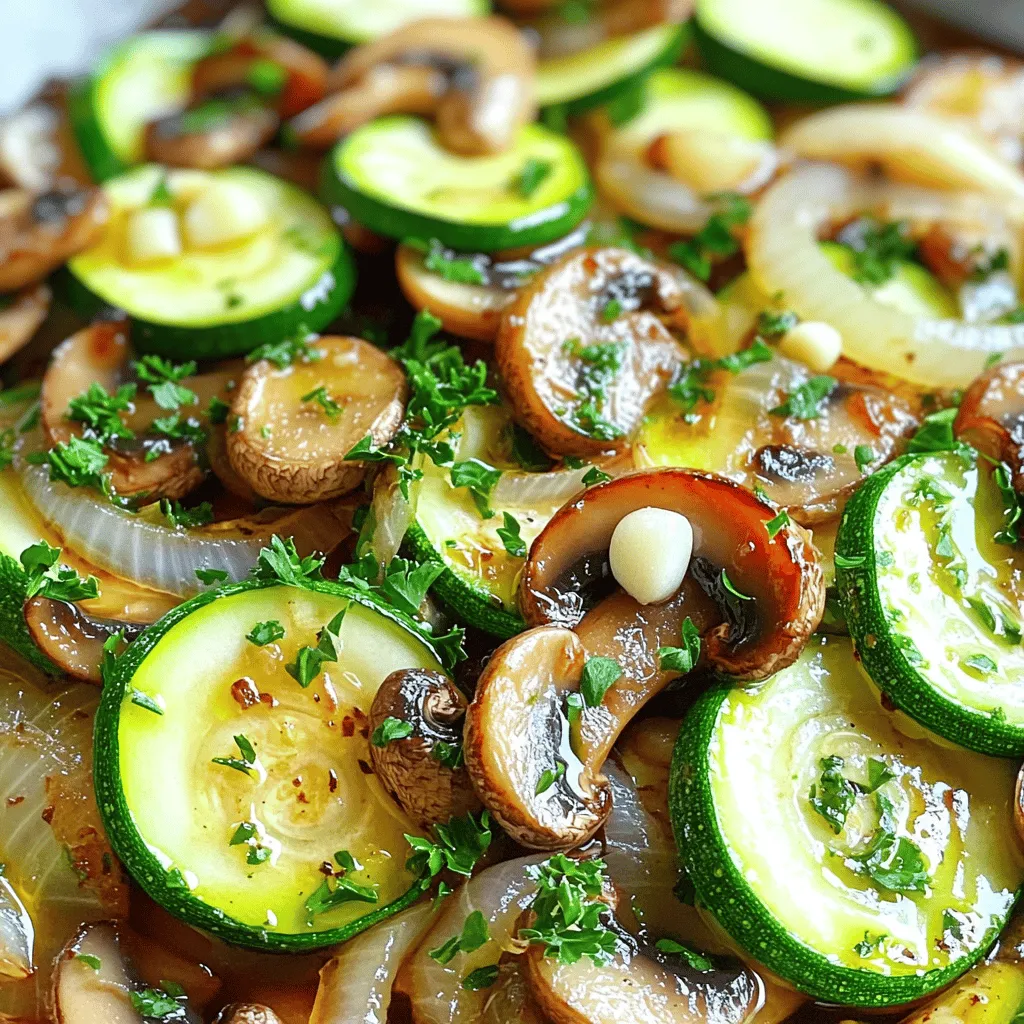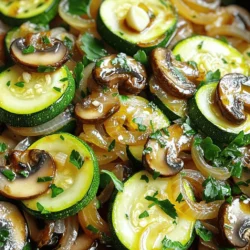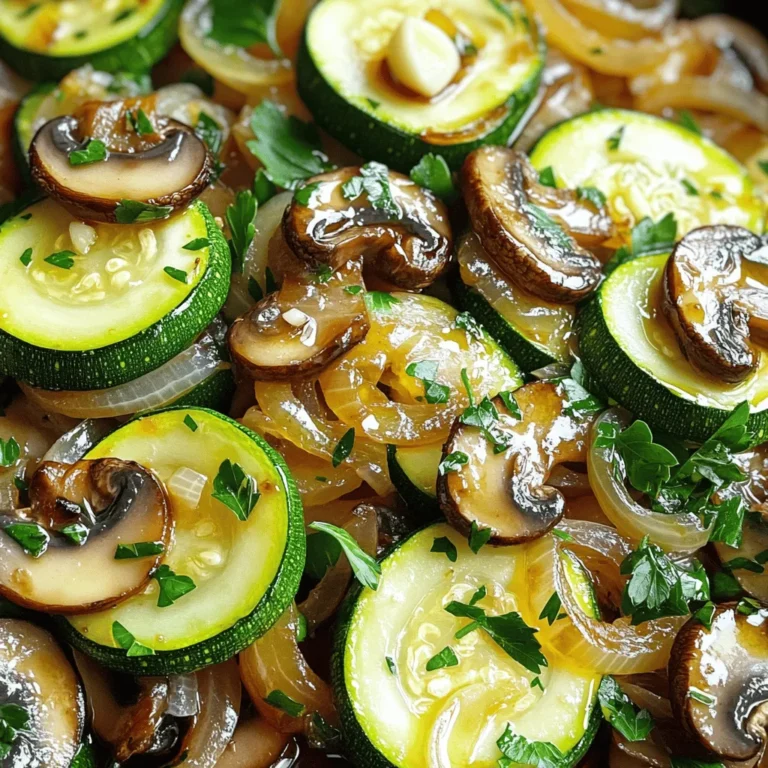Get ready to elevate your veggie game with my Garlic Sautéed Zucchini, Mushrooms, and Onions Delight! This dish is packed with flavor and easy to make. I’ll guide you through selecting fresh produce, perfect cooking techniques, and even fun variations. Whether you’re a kitchen newbie or a pro, this recipe will impress your taste buds. Let’s dive into these simple steps for a tasty side that everyone will love!
Ingredients
List of Ingredients
To make Garlic Sautéed Zucchini, Mushrooms, and Onions, you’ll need:
– 2 medium zucchinis, sliced into half-moons
– 8 ounces mushrooms, sliced (any variety)
– 1 large onion, thinly sliced
– 4 cloves garlic, minced
– 3 tablespoons olive oil
– 1 teaspoon dried thyme
– 1 teaspoon balsamic vinegar
– Salt and pepper to taste
– Fresh parsley, chopped (for garnish)
Optional Ingredient Substitutions
You can swap some ingredients to fit your taste:
– Instead of zucchini, try yellow squash for a different twist.
– Use shallots in place of onions for a milder flavor.
– Any mushrooms work well, but try portobello for a heartier bite.
– Fresh thyme can replace dried thyme for a more vibrant taste.
– Use lemon juice instead of balsamic vinegar for a zesty kick.
Tips for Selecting Fresh Produce
Choose the best veggies for this dish:
– Look for zucchinis that are firm and bright in color.
– Pick mushrooms that are smooth and dry, not slimy or dark.
– For onions, select ones that feel heavy and have dry skins.
– Fresh garlic should be firm and free from sprouts or soft spots.
– Always smell the produce; it should smell fresh and earthy.
Step-by-Step Instructions
Detailed Cooking Process
To start, gather your ingredients. You need zucchini, mushrooms, onion, garlic, olive oil, thyme, balsamic vinegar, salt, and pepper. First, heat the olive oil in a large skillet over medium heat. This will start the cooking process. Next, add the sliced onion to the skillet. Sauté them for 3 to 4 minutes until they are soft and translucent.
After that, add the minced garlic. Cook it for about 1 minute. Stir it often to stop it from burning. Now, it’s time to add the zucchini and mushrooms. Stir them well into the mix.
Sprinkle in the dried thyme, salt, and pepper. This adds great flavor. Sauté everything for 8 to 10 minutes. The zucchini should be tender but still crisp. The mushrooms will release their moisture, making the dish juicy.
Finally, drizzle the balsamic vinegar over the veggies. Cook for another minute to blend the flavors. Remove the skillet from the heat. You can garnish with fresh parsley before serving.
Cooking Techniques for Perfect Sautéing
Sautéing is all about temperature control. Start with medium heat to avoid burning. Use a large skillet to give your veggies space. They need room to cook evenly. Stir often to keep them from sticking. This helps them cook nicely without burning.
Always add garlic later in the process. It cooks faster than onions and zucchini. This way, it stays fragrant and tasty. Using a good-quality olive oil makes a difference as well. It adds depth to the dish.
Visual Cues for Doneness
Watch for the color and texture of your veggies. The onions should be soft and see-through. Zucchini should be bright green and tender. The mushrooms will look shrunken and juicy. If your zucchini feels soft but firm when you poke it, it’s done. The key is to keep them slightly crisp for the best taste.
Tips & Tricks
Essential Cooking Tips for Flavor Enhancement
To amp up the flavor of Garlic Sautéed Zucchini, Mushrooms, and Onions, choose fresh, high-quality ingredients. They make a big difference. When you slice the garlic, do it just before cooking. This keeps its strong flavor alive. Use extra virgin olive oil for a rich taste. It adds depth to the dish.
You can also add a squeeze of fresh lemon juice at the end. This brightens the flavors and adds a lovely zing. A pinch of red pepper flakes can provide a nice kick. Adjust the amount based on your spice preference.
Common Mistakes to Avoid When Sautéing
One common mistake is overcrowding the skillet. If you add too many veggies at once, they won’t sauté well. This leads to steaming instead of browning. Always give each ingredient space to breathe.
Another mistake is not heating the oil enough. If the oil isn’t hot before adding vegetables, they can become mushy. Wait until the oil shimmers to start cooking. Lastly, avoid stirring too often. Give the veggies time to brown. This adds flavor and texture.
How to Achieve the Best Texture
For the best texture, slice your zucchini and mushrooms evenly. This ensures they cook at the same rate. Zucchini should be tender but still slightly crisp. This usually takes about 8-10 minutes.
Keep an eye on the onions, too. They should become translucent without burning. Use a spatula to stir gently, allowing the veggies to develop a nice golden color. Before serving, let the dish rest for a minute. This helps the flavors meld together beautifully.

Variations
Alternative Veggies to Incorporate
You can swap in other veggies for this dish. Here are some tasty options:
– Bell peppers: Add color and sweetness.
– Spinach: Mix in fresh leaves for a nutrient boost.
– Eggplant: This gives a rich, creamy texture.
– Carrots: Thinly sliced carrots add crunch and natural sweetness.
Feel free to use what you have on hand. Each veggie brings its own unique flavor and texture.
Different Flavor Profiles (Herbs and Spices)
You can change the flavor with different herbs and spices. Here are a few ideas:
– Basil: This adds a fresh, sweet taste.
– Oregano: A classic choice that pairs well with zucchini.
– Red pepper flakes: Use these for a spicy kick.
– Lemon zest: This brightens the dish and adds freshness.
Mix and match these flavors to suit your taste. The goal is to make it your own!
Serving Suggestions and Pairings
Garlic sautéed zucchini, mushrooms, and onions go well with many dishes. Here are some great pairings:
– Serve over rice or quinoa for a filling meal.
– Add to pasta for a tasty veggie boost.
– Pair with grilled chicken or fish for protein.
– Top with cheese or nuts for added crunch.
These ideas help you create a full meal. Feel free to experiment with different sides!
Storage Info
How to Store Leftovers
Store your leftover Garlic Sautéed Zucchini, Mushrooms, and Onions in an airtight container. This keeps the flavors fresh. Make sure to cool the dish to room temperature first. Place it in the fridge for up to three days. If you prefer, use glass containers for easy reheating.
Reheating Instructions
To reheat, you can use the stovetop or microwave. For the stovetop, heat a pan over medium heat. Add a splash of olive oil to prevent sticking. Add the leftovers and stir until warm, about 5-7 minutes. If using the microwave, place the dish in a microwave-safe bowl. Heat in 30-second intervals, stirring in between. This helps heat evenly.
Freezing Tips for Extended Shelf Life
You can freeze this dish for later use. Just place it in a freezer-safe container. Make sure to leave some space at the top for expansion. It will keep well for up to three months. When ready to eat, thaw it in the fridge overnight. Reheat as mentioned above for the best taste.
FAQs
How long does it take to sauté vegetables?
Sautéing vegetables takes about 10 to 15 minutes. The exact time varies by vegetable type. For zucchini, mushrooms, and onions, I suggest cooking for about 8 to 10 minutes. This keeps them tender yet crisp. Stir them occasionally for even cooking. You can check for doneness by tasting. If they are soft and flavorful, they are ready!
Can I make this recipe vegan?
Yes, you can easily make this recipe vegan. All the ingredients are plant-based. Use olive oil as your cooking fat. The balsamic vinegar adds a nice tang. You can enjoy this dish without any animal products. It remains just as tasty and satisfying. Feel free to try adding other veggies for more variety!
What can I serve with sautéed zucchini, mushrooms, and onions?
This dish pairs well with many options. You can serve it alongside grilled chicken or fish for protein. It also goes great with rice or quinoa as a base. Try adding it to pasta for a hearty meal. For a lighter choice, serve it on a bed of greens. The flavors blend well with various cuisines and dishes!
In this blog post, we explored the key ingredients for sautéing, from fresh produce to substitutes. I shared a step-by-step guide on cooking techniques and visual cues for doneness. You learned tips to enhance flavor and avoid common mistakes. We also looked at variations with different veggies and spices, plus serving ideas. Finally, I covered storage methods to keep your leftovers fresh and tasty. Remember, practice leads to better results, so grab those ingredients and start sautéing!


